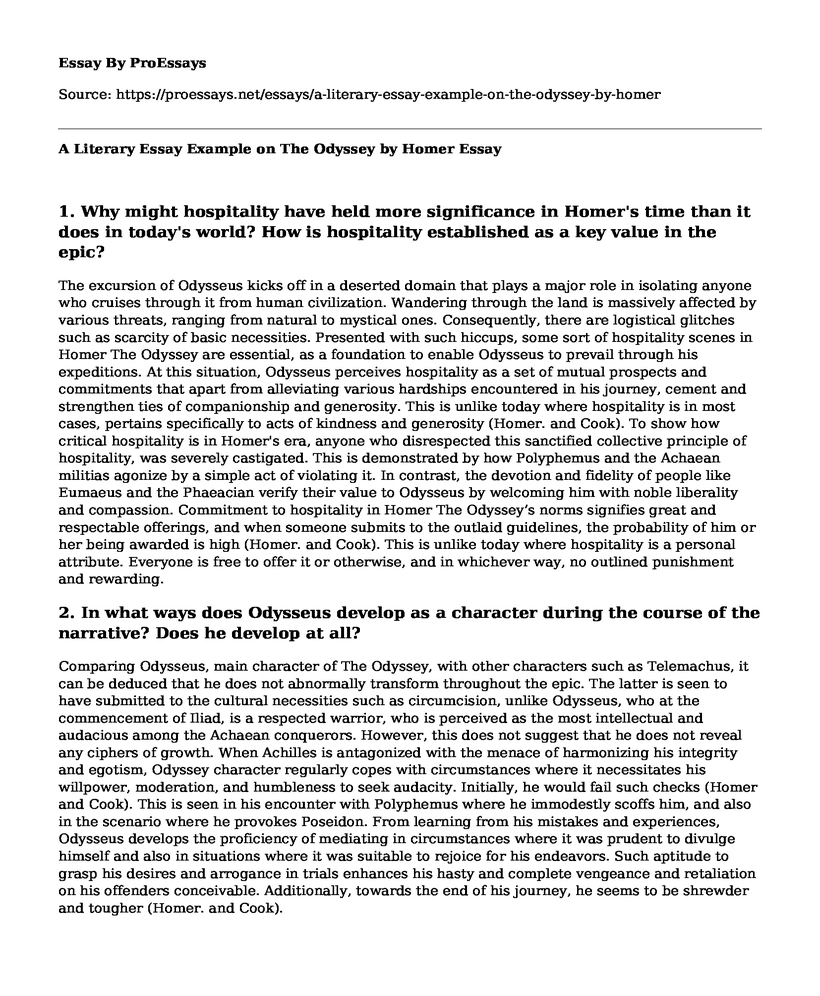1. Why might hospitality have held more significance in Homer's time than it does in today's world? How is hospitality established as a key value in the epic?
The excursion of Odysseus kicks off in a deserted domain that plays a major role in isolating anyone who cruises through it from human civilization. Wandering through the land is massively affected by various threats, ranging from natural to mystical ones. Consequently, there are logistical glitches such as scarcity of basic necessities. Presented with such hiccups, some sort of hospitality scenes in Homer The Odyssey are essential, as a foundation to enable Odysseus to prevail through his expeditions. At this situation, Odysseus perceives hospitality as a set of mutual prospects and commitments that apart from alleviating various hardships encountered in his journey, cement and strengthen ties of companionship and generosity. This is unlike today where hospitality is in most cases, pertains specifically to acts of kindness and generosity (Homer. and Cook). To show how critical hospitality is in Homer's era, anyone who disrespected this sanctified collective principle of hospitality, was severely castigated. This is demonstrated by how Polyphemus and the Achaean militias agonize by a simple act of violating it. In contrast, the devotion and fidelity of people like Eumaeus and the Phaeacian verify their value to Odysseus by welcoming him with noble liberality and compassion. Commitment to hospitality in Homer The Odyssey’s norms signifies great and respectable offerings, and when someone submits to the outlaid guidelines, the probability of him or her being awarded is high (Homer. and Cook). This is unlike today where hospitality is a personal attribute. Everyone is free to offer it or otherwise, and in whichever way, no outlined punishment and rewarding.
2. In what ways does Odysseus develop as a character during the course of the narrative? Does he develop at all?
Comparing Odysseus, main character of The Odyssey, with other characters such as Telemachus, it can be deduced that he does not abnormally transform throughout the epic. The latter is seen to have submitted to the cultural necessities such as circumcision, unlike Odysseus, who at the commencement of Iliad, is a respected warrior, who is perceived as the most intellectual and audacious among the Achaean conquerors. However, this does not suggest that he does not reveal any ciphers of growth. When Achilles is antagonized with the menace of harmonizing his integrity and egotism, Odyssey character regularly copes with circumstances where it necessitates his willpower, moderation, and humbleness to seek audacity. Initially, he would fail such checks (Homer and Cook). This is seen in his encounter with Polyphemus where he immodestly scoffs him, and also in the scenario where he provokes Poseidon. From learning from his mistakes and experiences, Odysseus develops the proficiency of mediating in circumstances where it was prudent to divulge himself and also in situations where it was suitable to rejoice for his endeavors. Such aptitude to grasp his desires and arrogance in trials enhances his hasty and complete vengeance and retaliation on his offenders conceivable. Additionally, towards the end of his journey, he seems to be shrewder and tougher (Homer. and Cook).
Work Cited
Homer., and Albert Cook. The Odyssey. 1st ed. New York: Norton, 1967. Print.
Cite this page
A Literary Essay Example on The Odyssey by Homer. (2021, Apr 13). Retrieved from https://proessays.net/essays/a-literary-essay-example-on-the-odyssey-by-homer
If you are the original author of this essay and no longer wish to have it published on the ProEssays website, please click below to request its removal:
- Theme of Insecurity in This Boys Life by Tobias Wolff
- Shakespeare Studies: Power Corrupts Essay
- Literary Analysis Essay on Phoniness and Authenticity in The Catcher in the Rye
- Characteristics of Ghazal in Hustle by Jericho Brown Essay Example
- Shakespeare's The Tempest Analysis Essay Example
- Fate in The Iliad: Women & War Prizes - Essay Sample
- Essay Example on Raskolnikov's Alienation from Society in Dostoyevsky's Crime and Punishment







